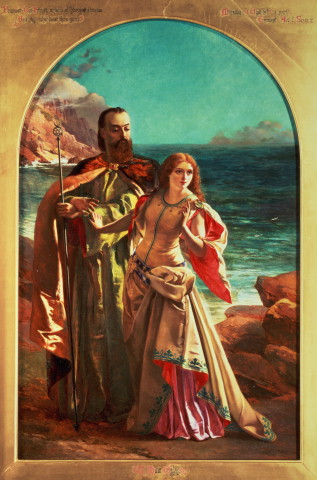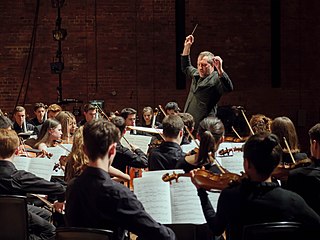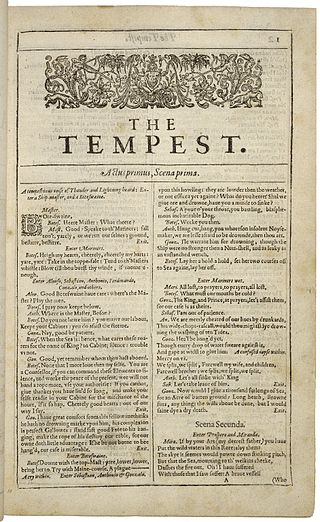Related Research Articles

The Pulitzer Prize for Music is one of seven Pulitzer Prizes awarded annually in Letters, Drama, and Music. It was first given in 1943. Joseph Pulitzer arranged for a music scholarship to be awarded each year, and this was eventually converted into a prize: "For a distinguished musical composition of significant dimension by an American that has had its first performance in the United States during the year."

Prospero is a fictional character and the protagonist of William Shakespeare's The Tempest.
Ellen Taaffe Zwilich is an American composer, the first female composer to win the Pulitzer Prize for Music. Her early works are marked by atonal exploration, but by the late 1980s, she had shifted to a postmodernist, neoromantic style. She has been called "one of America's most frequently played and genuinely popular living composers." She was a 1994 inductee into the Florida Artists Hall of Fame. Zwilich has served as the Francis Eppes Distinguished Professor at Florida State University.
Caliban, the subhuman son of the sea witch Sycorax, is an important character in William Shakespeare's play The Tempest.
Shulamit Ran is an Israeli-American composer. She moved from Israel to New York City at 14, as a scholarship student at the Mannes College of Music. Her Symphony (1990) won her the Pulitzer Prize for Music. She was the second woman to win the Pulitzer Prize for Music, the first being Ellen Taaffe Zwilich in 1983. Ran was a professor of music composition at the University of Chicago from 1973 to 2015. She has performed as a pianist in Israel, Europe and the U.S., and her compositional works have been performed worldwide by a wide array of orchestras and chamber groups.
Alfred Whitford (Fred) Lerdahl is an American music theorist and composer. Best known for his work on musical grammar, cognition, rhythmic theory and pitch space, he and the linguist Ray Jackendoff developed the Chomsky-inspired generative theory of tonal music.

Thomas Joseph Edmund Adès is a British composer, pianist and conductor. Five compositions by Adès received votes in the 2017 Classic Voice poll of the greatest works of art music since 2000: The Tempest (2004), Violin Concerto (2005), Tevot (2007), In Seven Days (2008), and Polaris (2010).
Paul Moravec is an American composer and a University Professor at Adelphi University on Long Island, New York and also a member of the composition department of the Mannes School of Music. Already a prolific composer, he has been described as a "new tonalist." He is best known for his work Tempest Fantasy, which received the 2004 Pulitzer Prize for Music. Among his compositions are two operas: The Letter (2009) and The Shining (2016).

Prospero's Books is a 1991 British avant-garde film adaptation of William Shakespeare's The Tempest, written and directed by Peter Greenaway. Sir John Gielgud plays Prospero, the protagonist who provides the off-screen narration and the voices to the other story characters. As noted by Peter Conrad in The New York Times on 17 November 1991, Greenaway intended the film “as an homage to the actor and to his 'mastery of illusion.' In the film, Prospero is Shakespeare, and having rehearsed the action inside his head, speaking the lines of all the other characters, he concludes the film by sitting down to write The Tempest.”

The Piano Sonata No. 17 in D minor, Op. 31, No. 2, was composed in 1801–02 by Ludwig van Beethoven. The British music scholar Donald Francis Tovey says in A Companion to Beethoven's Pianoforte Sonatas:
"With all the tragic power of its first movement the D minor Sonata is, like Prospero, almost as far beyond tragedy as it is beyond mere foul weather. It will do you no harm to think of Miranda at bars 31–38 of the slow movement... but people who want to identify Ariel and Caliban and the castaways, good and villainous, may as well confine their attention to the exploits of Scarlet Pimpernel when the Eroica or the C minor Symphony is being played."
Paul Seiko Chihara is an American composer.
Wayne Peterson was an American composer, pianist, and educator. He won the Pulitzer Prize for Music for The Face of the Night, the Heart of the Dark in 1992, when its board overturned the jury's unanimous selection of Concerto Fantastique by Ralph Shapey.
The Tempest is an opera by English composer Thomas Adès with a libretto in English by Meredith Oakes based on the play The Tempest by William Shakespeare.
Noises, Sounds & Sweet Airs is a 1991 opera by Michael Nyman that began as an opera-ballet titled La Princesse de Milan choreographed by Karine Saporta. The libretto is William Shakespeare's The Tempest, as abridged by the composer. The title is derived from Caliban's line, "This isle is full of noises, sounds, and sweet airs, which give delight and hurt not." It premiered in June 1991 in Hérouville-Saint-Clair, Calvados, France, with the L'Ensemble de Basse-Normandie conducted by Dominique Debart. Three members of Saporta's dance company provided the singing.

Ariel is a spirit who appears in William Shakespeare's play The Tempest. Ariel is bound to serve the magician Prospero, who rescued him from the tree in which he was imprisoned by Sycorax, the witch who previously inhabited the island. Prospero greets disobedience with a reminder that he saved Ariel from Sycorax's spells, and with promises to grant Ariel his freedom. Ariel is Prospero's eyes and ears throughout the play, using his magical abilities to cause the tempest in Act One which gives the play its name, and to foil other characters' plots to bring down their master.

Voyage to Melonia is a 1989 Swedish-Norwegian animated adventure fantasy film directed by Per Åhlin, loosely based on William Shakespeare's The Tempest, with further inspiration from Jules Verne's Propeller Island and Charles Dickens' Oliver Twist. It was Åhlin's first fully animated feature film, as his earlier films Out of an Old Man's Head and Dunderklumpen! had both used a mix of animation and live action.

The Tempest is a play by William Shakespeare, probably written in 1610–1611, and thought to be one of the last plays that he wrote alone. After the first scene, which takes place on a ship at sea during a tempest, the rest of the story is set on a remote island, where Prospero, a wizard, lives with his daughter Miranda, and his two servants: Caliban, a savage monster figure, and Ariel, an airy spirit. The play contains music and songs that evoke the spirit of enchantment on the island. It explores many themes, including magic, betrayal, revenge, and family. In Act IV, a wedding masque serves as a play-within-a-play, and contributes spectacle, allegory, and elevated language.
James Francis Brown is an English composer. He studied composition with the Viennese émigré Hans Heimler and then at the Royal Academy of Music, London.
Steel Hammer is a 2009 composition for three sopranos and chamber ensemble by the American composer Julia Wolfe. It was first performed on November 21, 2009, at Zankel Hall by the contemporary classical music groups Bang on a Can and Trio Mediæval. The piece is based on the ballad of the African-American tall tale John Henry. The composition was a finalist for the 2010 Pulitzer Prize for Music.
The Piano Concerto No. 3 is a composition for solo piano and orchestra by the American composer Peter Lieberson. The work was commissioned by the Minnesota Orchestra for the ensemble's centennial. It was given its world premiere by the pianist Peter Serkin and the Minnesota Orchestra in Minneapolis on November 26, 2003. The piece is dedicated to Peter Serkin and was a finalist for the 2004 Pulitzer Prize for Music.
References
- ↑ "Paul Moravec Wins Pulitzer Prize For Tempest Fantasy". NewMusicBox . April 5, 2004. Retrieved April 14, 2015.
- ↑ Downey, Charles T. (March 11, 2013). "Left Bank Quartet gives solid but spotty performance". The Washington Post . Retrieved April 14, 2015.
- ↑ Lowe, Jim (February 25, 2005). "Paul Moravec: The conventional unconventionally". Barre Montpelier Times Argus . Archived from the original on September 29, 2015. Retrieved April 14, 2015.
- ↑ Johnson, Daniel Stephen (February 1, 2012). "Paul Moravec: Mining Tonality for New Intricacies, The Pulitzer Prize-winning Composer Introduces his Music". WQXR-FM . Retrieved April 14, 2015.
- ↑ Simeone, Lisa (April 5, 2004). "Moravec Wins Music Pulitzer: American Composer Recognized for Chamber Work". NPR . Retrieved April 14, 2015.
- ↑ Shattuck, Kathryn (April 22, 2007). "A Composer Who's Weathered Some Tempests of His Own". The New York Times . Retrieved April 14, 2015.